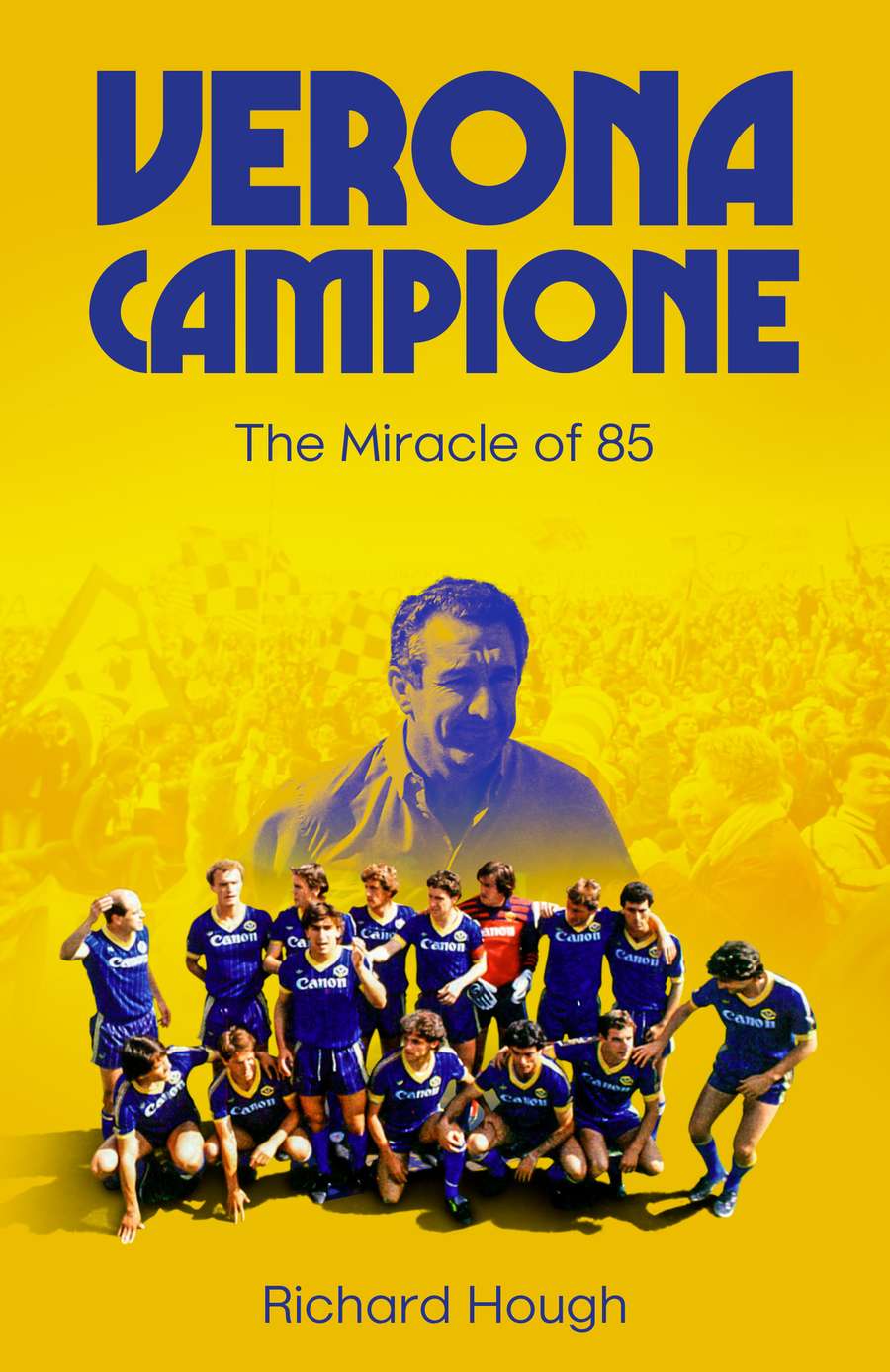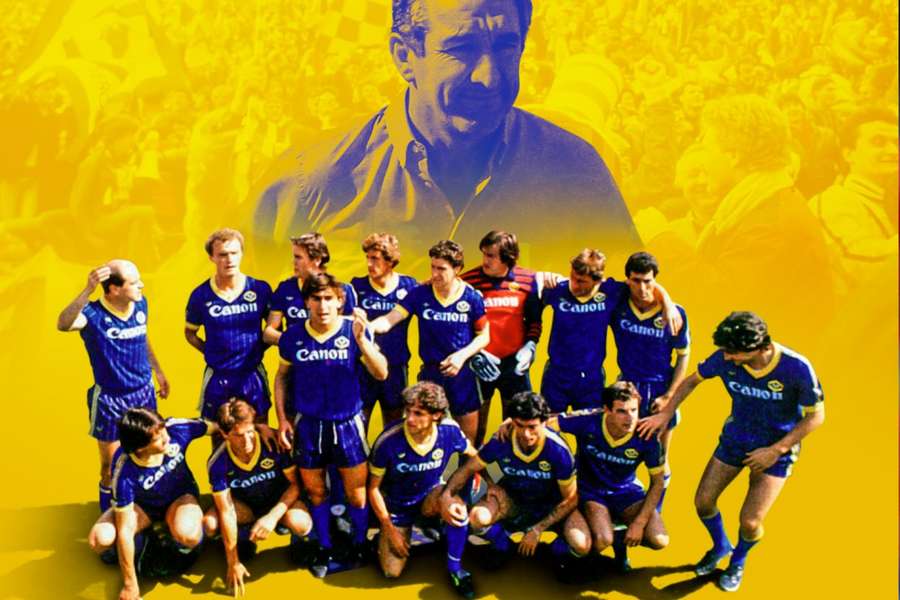Coming in second in the Ballon d’Or that year, here is how Elkjær remembers that season.
Apparently, Giovanni Trapattoni didn’t think it was such a big surprise that Verona won the championship?
“Well, it was. No one was putting Verona up for the championship. I mean, not a single soul. Before I signed, I asked Michael Laudrup and Klaus Berggreen, who were both playing in Italy, what they thought. They just said, “yeah, that’s a nice city.” That was the general opinion.
“Both of them said Verona had a good football team, though, and it would be a really good season for a provincial club like Verona to finish fifth or sixth. Don’t’ forget, all the best players in the world were playing in Serie A at that time. Italy won the World Cup in ’82, Platini, Maradona, Zico, Falcao, Rummenigge, Sokrates, Junior, you name them, there were all there. And then there was little Verona with a couple of lesser-known players”.
You were coached by Osvaldo Bagnoli. He seems like a very serious man who kept his distance to the players?
“He could pass us in the hall without even noticing us. He was a very serious man. He didn't say much. He didn't create chaos. He created peace and order. He had a philosophy. Perfect football is when you have three passes and then you score. It should never be too complicated. His second philosophy was that you should line up the players in their right places. That is not as easy as it sounds.
“If we were behind 1-0 at half-time, he was good at saying, “we always score against them, don’t worry, we’ll get one in the second half. He’d come in and said things like that. I remember playing Inter, 1-0 down at half-time, and he said: take it easy, keep playing, we'll get the goal. We always score against Inter. And we did. He was very good at reading the game and reading the opponent.”
You were bought before the season along with Hans-Peter Briegel of Germany. The book talks about how the two of you got a little worried after meeting your fellow players for the first time. Is that how you remember it?
“Both Briegel and me were used to football being very physical. Briegel from Germany and me in Belgium. As we were driving home after one of the first training sessions, we talked about these guys not being very big. We could see that they could play football, but we were used to players with a lot more physique about them. But that was one of the reasons they brought us in. They knew they lacked some physical strength.
“You can't imagine how big he was. He was a physical specimen. But he was a good footballer, too. A lot of people underestimated his footballing skills, but he was a really good player. None of us that played with him underestimated him. We trained with him every day and could see how good he was."
Fatigue is mentioned quite a bit towards the end of the season, when things weren’t going as smoothly as at the start of the season. The season was just 30 league games which is nothing compared to nowadays?
“I know, but we were only 16 players. Our whole squad consisted of 16 players. It was the same players all the time. Actually, this surprised me a lot. Before the season we went on a training camp and he called the squad in and said; this is the team this year. And then he announced how the starting line-up would be the whole season. I'd never heard of that before. I thought, what the hell does that mean?
“But he did it because he didn't want any trouble from those who didn't play. It was like; when these 11 are all fit, they will start. That was a bit special. But there wasn’t any trouble because we were a really strong group. We were such good friends. There was a fantastic team spirit in that side.
“I’ve heard some say 'they began to believe half-way during the season' but that is nonsense. There were never many points between us and the followers. It was tight all the way. I kept thinking that we would get caught and then lose three games in a row or something like that. I wasn't sure at all that we were going to make it. Not even when we went to Bergamo in the penultimate round, where we could actually seal the title against Atalanta. Even at that point I was thinking, “If we lose here, it can still go wrong”. There were some big clubs chasing us. Inter, Juventus, Roma, Torino, who had Junior, the brazilian, damn, he was good.”

We seen other examples of smaller clubs battling for the title without being able to finish it off like you did. Parma is an example. Why do you think that you, this squad of players, were able to do it?
“Because we were such good friends. There was a fantastic atmosphere. Besides the fact that there were good players, of course. The other thing is that many of our players had something to prove. They were mostly all players who were picked up from bigger clubs, where they hadn't completely reached their peak.
“Fanna and Galderisi came from Juventus, Fontolan from Inter, we had three from Fiorentina, who were really good players, but Fiorentina was also a big club. So, they came to Verona eager to prove it was a mistake they were sold.”
You still have a WhatsApp group with the squad from back then and you meet up occasionally?
“Yes, we do. In fact, we were there recently and presented at the stadium because of the jubilee. There were 10 of us present. Some couldn’t make it and one has passed away. It was great to see them again. I see some of them every time I'm in Verona. Then we have dinner together.”
You took on Napoli with Diego Maradona in the first game. What was that like?
“I was very excited to meet them. Up until the season began, we’d played a lot of friendlies, but not against any big teams. So, I was curious about how our team was compared to a good Serie A side like Napoli. Beating them 3-1 gave me an idea that this team isn’t half bad. And then we won the next two as well and the rest is history.”
Looking purely at the numbers, you scored eight goals in that season. Even Briegel scored more. Still, you finished second in the Ballon d'Or in 1985. Can you put some words in to what you think you brought to the team aside from goals?
“I was top scorer in the qualification to the World Cup 1986 in Mexico. So, there was more to it than winning the Serie A. I added some speed and a very good physique to the side. And unpredictability. I was injured for seven or eight games and back then, and you didn’t score lot of goals in the Serie A back then. Platini was topscorer with 18 goals. And he took all penalties and freekicks. I didn't do any of that.
“To be honest, I think I should have won the Ballon d’Or in 1985. I had an exceptional season, with both Verona and the Danish national team. But it was arranged by France Football so they went with Michel Platini as usual. Only, he wasn’t nearly as good as in ’83 and ’84. Over a whole season, I believe it might as well have been me. But I'm very proud to have been voted in the top four three years running.”
As you mentioned, Serie A had the cream of the crop back then when we’re talking players. Were there any players who you thought, while you were actually on the pitch, “wow, he's good”?
“There were many. On the pitch, you could see what they were capable of. Zico was fantastic. Maradona, too. But there were a lot of players in the Danish national team back then where I also thought, “hold on, he's a top player.”
How about defenders back then, how tough were they actually?
“Oh, they were tough. They were man-marking back then which meant you had a guy on your back the whole time. And he didn't move. That was new to me. I came from Belgium where they played a zonal defense. You had to get used to the fact that you had a man on you all the time. And they played really hard. I mean brutal. But that was the style back then. It wasn't just in Italy.”
You played with Paolo Rossi towards the end of his career. How was he compared to other strikers you've played with?
“He was worn out. He had some terrible knee injuries and other problems. It wasn't the Paolo Rossi he had been a few years before. But he was the nicest person in the world. And he was a huge star in Italy. When he went around with us, the fans were all over the place. The World Champion and topscorer in ’82. It is a sad thing that he’s passed away, he was so nice.”
Players like Fanna and Garella left the club after the season. You must have received offers from bigger clubs as well?
“Lots of them. But Verona wouldn’t sell. Back then, the players had very little say in the matter. I know, Roma was after me at one point. Genoa as well, but I only heard of those many months later.”
The current mayor of Verona is a former Hellas-player, Damiano Tomassi. You’ve been called mayor down there for years. Do they still do that?
“They do and it doesn’t matter who the real mayor is. And yes, I still get spoiled when I visit the town.”
“Verona Campione” is out now with Pitch Publishing and can be purchased here, at assorted bookshops or at the website here.
